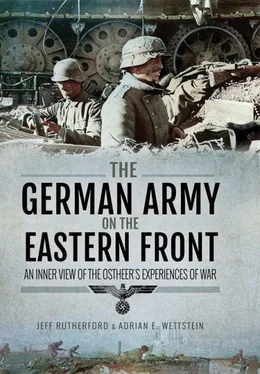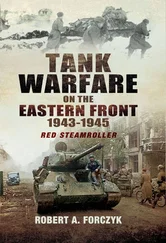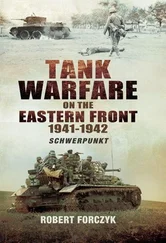b) […]
Furthermore, the enemy’s high casualties suffered due to our tenacious resistance, in combination with the expected snowfalls of mid-winter, will paralyse the Soviet-Russian attacks. Until this point in time, the order of the hour is that every village and town is to be firmly clung to, no yielding of one step, to defend one’s self to the last bullet and grenade.
I expect that every officer, NCO, and man will commit themselves in this sense until the last breath. […]
Only by such a means of combat and from no other will the success of this winter defensive battle and the victory of 1942 ripen.
Not only did Hitler’s order challenge the army’s traditional practice of allowing commanders to make operational and tactical decisions on the spot, but it also made clear that the German army had now shifted over to the defensive; the blitzkrieg that had been operating in fits and starts since 22 June had now finally ended. VIIth Corps then distributed its own order, emphasizing various elements of Hitler’s order. [24]
The main combat zone is to be held to the last man and without consideration of the changing situation of one’s neighbour. By-passed, cut-off or encircled elements defend themselves in their positions .
[…]
The town commanders are responsible for the strengthening of their towns. To this end, all units billeted there are subordinated to him. No German soldier – it makes no difference which troop he belongs to – can be spared for the defence and its preparation.
The civilian population is to be used ruthlessly for this work.
[…]
A place is only to be given up when the last cartridge has been fired. Then everything that is useable is to be destroyed, the ovens are to be smashed and every house is to be set on fire. The taking of a town should give the enemy not the slightest possibility for shelter and relief.
Such orders not only encouraged the German army to act ruthlessly in order to ensure its own combat efficiency, but they also provided some certainty to units that had been caught between retreat and maintaining the line during the chaotic period of the winter crisis. For the 7th Infantry Division, these orders were simultaneously welcomed and questioned. [25]
The order to finally hold here is welcomed with relief by the commander and the troops after the perpetual back and forth, now that the position of the 7th Division is suitably entrenched. Based on previous experiences, the division is not quite completely convinced that this is the ultimate solution . But all the consequences have been drawn and all strength has been shifted to the construction and holding of the position!!
This defensive fighting, however, made just as many demands on soldiers as the advance did in 1941. Two additional factors exacerbated the combat of early 1942, both essentially due to the belief that the invasion would require only three months at most to achieve victory. First, the German replacement system nearly broke down, as there simply were not enough trained men in the Reich to replace the severe casualties suffered by the Germans during the invasion. Second, due in part to an overly strained supply system, the accumulation and delivery of winter clothing was not nearly sufficient to meet the needs of the army and this led to an ever-increasing incidence of frostbite, which necessarily weakened the army’s combat efficiency. The following entry from the 126th Infantry Division’s war diary illustrates the problems afflicting the division during its deployment along the Volkhov River in January 1942. [26]
Our own situation is essentially defined by the high [number of] casualties and losses due to frostbite, which the division has suffered in the fighting for the Volkhov Position that has now continued for 10 days. The powers of resistance of the combat troops [who are fighting] with the utmost bravery have considerably decreased as a result of the unbroken pressure of a numerically superior enemy and one with a considerable superiority in heavy weapons, as well as due to the outsized exertions and unsatisfactory clothing and equipment for the present weather. Therefore, the division faces the shortly expected massive enemy attacks with great concern.
For the majority of Army Groups Centre and North, the fighting in 1942 degenerated into positional warfare, as the Germans attempted to hold their lines against various generally poorly coordinated Soviet offensives. On the southern portion of the front, however, the Germans concentrated their mechanized and motorized formations in preparation for another blitz campaign, Operation Blue. Here, the ultimate goal was the seizure of the Caucasian oil fields. The offensive that emerged, however, differed from that of 1941 in two important ways. First, it was much smaller than that of the previous year, as only one Army Group went on the attack. Second, German field commanders saw their control over their formations significantly decrease, as both the Army High Command ( Oberkommando des Heeres or OKH) and Hitler looked to circumscribe their independence. One similarity that it shared with the Barbarossa campaign was the offensive’s lack of a main point of emphasis. Just as in 1941 when the Germans were divided between a direct assault on Moscow and one that looked to the economically advantageous areas on the flanks, so too did Operation Blue suffer from a dispersion of force. As the campaign developed, Hitler placed increasing emphasis on what was initially seen as a subsidiary drive to Stalingrad to cover the flank of the drive on the Caucasus until it was given equal weight, thereby completely eliminating any notion of one overarching objective. By dissipating the strength of the southernmost advance, he ensured that neither could succeed. [27]
While the campaign started successfully enough in late June, by the end of September the familiar problem of stiffening Soviet resistance, over-extended supply lines and a diminishing combat strength advancing in divergent directions made it clear that the campaign had already failed. A meeting between Generaloberst Hermann Hoth, commanding general of Fourth Panzer Army, and the commander of XXXXVIIIth Panzer Corps in early September detailed the superiority of German tactics and practices in 1942, as well as the increasing emphasis on the notion of will in the face of German material weakness. [28]
Everywhere that the Panzer forces have been deployed narrowly concentrated and with force, the attack has been successful. The new redeployment of the corps will and must lead to success. It is clear that the enemy – compressed into a narrow area – will offer considerable resistance.
Just as the great King before the battle of Leuthen [29]took the decision to attack and defeat the enemy from an apparently hopeless position, so now all commanders and every man must be imbued with this idea, that the attack will be successful, because it must be successful for us!
Commanders who cannot guarantee the carrying out of this difficult task are to be replaced by others.
The German attack on the city of Stalingrad – the culmination of the 1942 German summer offensive – was severely hindered from the outset by supply and manpower shortages; it also is rightfully seen as one of the important turning points, both militarily and psychologically, of the Second World War. Manpower deficiencies proved extremely detrimental to German attacks on the city. Most units that fought in Stalingrad had not reached their full complement of men even before the German summer offensive began at the end of June. By mid-September, the majority of the units had fought without respite for nearly two months and had received few replacements, and this manpower situation considerably worsened due to heavy combat within the city. The 71st Infantry Division, an experienced first-class infantry unit that carried out the primary thrust into the centre of the city, reported the following strength of its infantry units on 19 September 1942: [30]
Читать дальше






![John Stieber - Against the Odds - Survival on the Russian Front 1944-1945 [2nd Edition]](/books/405234/john-stieber-against-the-odds-survival-on-the-russian-front-1944-1945-2nd-edition-thumb.webp)





